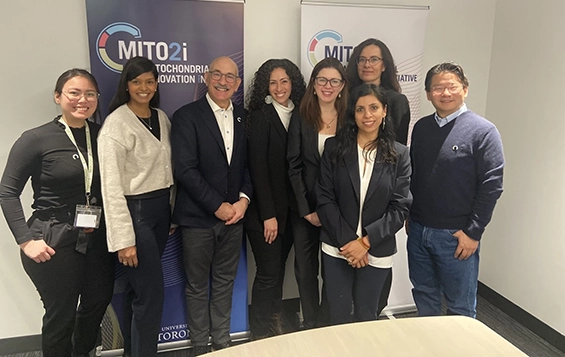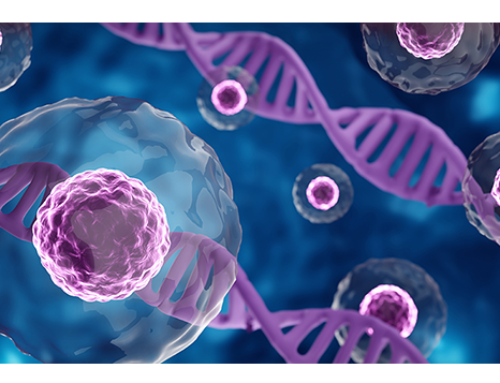
Left to right: Erika Beroncal, Sonya Brijbassi, Ori Rotstein, Mikaela Gabriel, Ana Andreazza, Sowmya Viswanathan, Milica Radsic, Frank Gu.
This article is reprinted from the Temerty Faculty of Medicine at the University of Toronto.
Medicine by Design has supported the Mitochondrial Innovation Initiative as part of the Convergent Working Groups projects, which helped bring this group of researchers together.
The University of Toronto (U of T) and partner institutions have received a $23.8 million New Frontiers in Research Fund – Transformation grant to pioneer mitochondrial transplantation therapy, an emerging field that could change how the world treats organ failure, chronic inflammation and degenerative diseases.
The project, MitoRevolution: Mitochondrial Transplantation Transforming Regenerative Medicine — from research to patient care to global impact, is led by Ana Andreazza, professor of pharmacology and toxicologyat U of T’s Temerty Faculty of Medicine and founder & scientific director of the Mitochondrial Innovation Initiative (MITO2i).
Mitochondria — the energy-producing structures within cells — play a critical role in cellular health and function. Dysfunction in these tiny powerhouses underlies a wide range of acute and chronic diseases. The MitoRevolution team is developing a therapeutic approach that delivers healthy mitochondria directly into damaged cells, offering new hope for regeneration and recovery where conventional medicine has fallen short.
“We believe mitochondrial transplantation will reshape the landscape of regenerative medicine,” says Andreazza. “This isn’t about managing disease. It’s about restoring life at its most fundamental level — and ensuring that this breakthrough reaches everyone.”
The MitoRevolution project brings together an interdisciplinary team committed to transforming regenerative medicine through mitochondrial transplantation. Andreazza and Professor Frank Gu (department of chemical engineering & applied chemistry) lead the advancement of novel mitochondrial transplant techniques with the integration of AI-driven delivery technologies and materials engineering to create scalable, clinically viable systems.
Professors Milica Radisic (Institute of Biomedical Engineering, and University Health Network) and Sowmya Viswanathan (department of medicine, and University Health Network) direct efforts to validate safety and efficacy through sophisticated organ-on-a-chip platforms and animal models.
Professors Ori Rotstein (department of surgery, and Unity Health Toronto) and Marcelo Cypel (department of surgery, and University Health Network) oversee the translation of this therapy into clinical trials targeting multiple organ systems, while Professor Mikaela Gabriel (Dalla Lana School of Public Health, and Unity Health Toronto) along with community partners including MitoCanada foundation, leads the development of Indigenous health integration, and ethical, inclusive, and scalable models for equitable patient care for diverse global populations.
The implications of this work extend well beyond the laboratory, with the potential to reshape several areas of medicine. The research offers the opportunity to significantly reduce inflammation and improve quality of life for patients with both acute and chronic conditions. In the context of organ transplantation, the work could dramatically extend the viability of donor organs, reduce rates of rejection, and expand the transplant pool — offering hope to patients who previously had limited options.
The vision for the project arose by bringing together researchers with an interest in mitochondria transplantation through a co-partnership Medicine by Design and MITO2i, and support from key partners including Unity Health Toronto, University Health Network and the Ajmera Transplant Centre.
“This is a paradigm shift,” says Andreazza. “We are not just treating symptoms — we are restoring energy at the source, giving cells the ability to heal.”
To learn more about the Mito Revolution please visit https://www.mitoinnovation.com.



